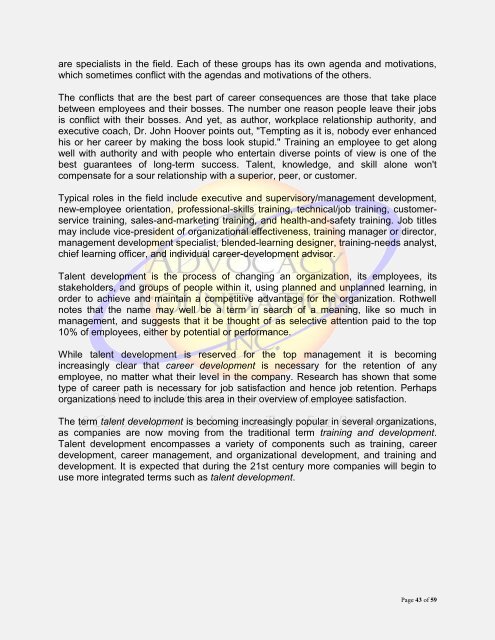Professional Development - Vol. IV, Part I
Professional Development - Vol. IV, Part I
Professional Development - Vol. IV, Part I
Create successful ePaper yourself
Turn your PDF publications into a flip-book with our unique Google optimized e-Paper software.
are specialists in the field. Each of these groups has its own agenda and motivations,<br />
which sometimes conflict with the agendas and motivations of the others.<br />
The conflicts that are the best part of career consequences are those that take place<br />
between employees and their bosses. The number one reason people leave their jobs<br />
is conflict with their bosses. And yet, as author, workplace relationship authority, and<br />
executive coach, Dr. John Hoover points out, "Tempting as it is, nobody ever enhanced<br />
his or her career by making the boss look stupid." Training an employee to get along<br />
well with authority and with people who entertain diverse points of view is one of the<br />
best guarantees of long-term success. Talent, knowledge, and skill alone won't<br />
compensate for a sour relationship with a superior, peer, or customer.<br />
Typical roles in the field include executive and supervisory/management development,<br />
new-employee orientation, professional-skills training, technical/job training, customerservice<br />
training, sales-and-marketing training, and health-and-safety training. Job titles<br />
may include vice-president of organizational effectiveness, training manager or director,<br />
management development specialist, blended-learning designer, training-needs analyst,<br />
chief learning officer, and individual career-development advisor.<br />
Talent development is the process of changing an organization, its employees, its<br />
stakeholders, and groups of people within it, using planned and unplanned learning, in<br />
order to achieve and maintain a competitive advantage for the organization. Rothwell<br />
notes that the name may well be a term in search of a meaning, like so much in<br />
management, and suggests that it be thought of as selective attention paid to the top<br />
10% of employees, either by potential or performance.<br />
While talent development is reserved for the top management it is becoming<br />
increasingly clear that career development is necessary for the retention of any<br />
employee, no matter what their level in the company. Research has shown that some<br />
type of career path is necessary for job satisfaction and hence job retention. Perhaps<br />
organizations need to include this area in their overview of employee satisfaction.<br />
The term talent development is becoming increasingly popular in several organizations,<br />
as companies are now moving from the traditional term training and development.<br />
Talent development encompasses a variety of components such as training, career<br />
development, career management, and organizational development, and training and<br />
development. It is expected that during the 21st century more companies will begin to<br />
use more integrated terms such as talent development.<br />
Page 43 of 59

















